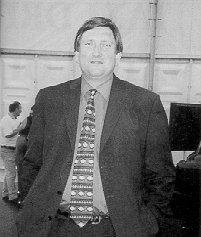INTERNATIONAL ROAD USERS TAXI GROUP REPORT

Wheelchair Accessibility
It even had its bearing on several other topics, like the
possibility for the taxi to play its role as the (main) provider of accessible
transport for the mobility-impaired. In this area, the Group welcomed a recent
study commissioned jointly by the ECMT and IRU, which echoes the Group's view
that taxi fleets would not have to be completely, but only proportionally
wheelchair accessible in order to provide a quality service to the
mobility-impaired. Unfortunately, the same study leaves open the possibility
for a local government to require taxis to be fully wheelchair accessible. This
is unacceptable to the taxi trade.
Issues like close co-operation between the taxi industry and public transport
in building a sustainable and seamless transport network, which can effectively
compete with the private car, are of interest to all European countries. Having
already discussed various forms of co-operation between the public transport
association UITP and the Taxi Group, just before the Taxi Group meeting IRU and
UITP decided on closer co-operation in the field of passenger transport.
Wim Faber
Brussels, Belgium
Report by Wim Faber
The European taxi industry, represented by the IRU Group 'Taxis and Hire
Cars with Driver' met in Budapest in October. Among the fifteen member
associations and 35 participants from the taxi industry present, there were
representatives from Romania, Bulgaria, Hungary, Germany, Austria, France,
Luxembourg, Belgium, The Netherlands, Sweden, Norway, Denmark, Finland and
the UK. Dial-a-Cab were not present on this occasion.
The group was extremely concerned about the recent rises in oil
prices and the lack of compensatory measures for the taxi trade in some
European countries. In their meeting of September 20, the European transport
ministers decided against action at EU Ievel, whereas countries like France
(taxi tariff increase of 4.5%) and The Netherlands (a raise of the
maximum-tariff and a compensation system for the year 2000 - depending on EU
derogation), were quickly off the mark. Other countries have not addressed
this issue yet or sufficiently. With steeply rising operating costs for the
taxi trade, the Taxi Group was particularly worried about the trade's
ability to adequately perform its role as the most flexible form of public
transport - being closest to the private car.
Rising costs for the taxi trade due to higher diesel, petrol
and
It should not be forgotten that the European taxi trade is largely deprived of the type of fuel compensation routinely given to public transport companies.
In a few European countries, the taxi industry - usually in close unity with other transport partners - participated in demonstrations demanding compensation for risen oil prices. It was no surprise then that 'fuel-prices' proved to be a recurrent theme at the IRU meeting.
As at every Taxi Group meeting, several other pressing issues were discussed (EU Commission Proposal on Public Services, the Group's International Cost comparison, plans for structuring the taxi trade's co-operation with public transport in the field of demand-responsive transport systems, the International Taxi & For Hire Vehicle Directory and a proposal for an International Taxi Classification System), but the 'fuel-problem' kept cropping up at various stages of the meeting.
